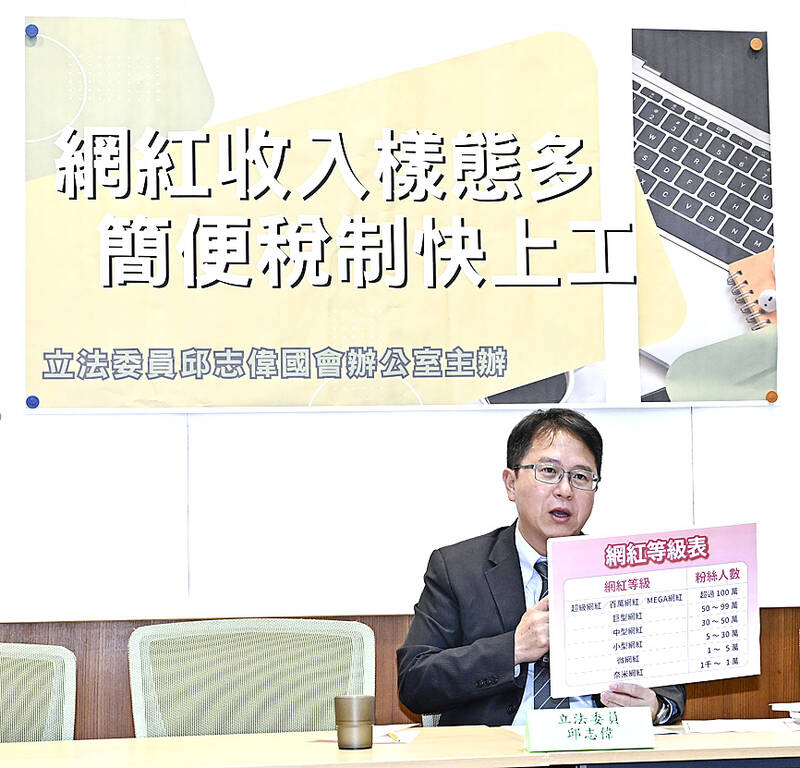Democratic Progressive Party Legislator Chiu Chih-wei (邱志偉) yesterday urged the government to create rules for taxing online content creators, citing widespread confusion in the industry.
Chiu made the comment at a news conference at the Legislative Yuan in Taipei.
A YouTuber known as “Hsiao Yu” (小玉) was recently made to pay NT$460,000 to the Taxation Administration for being in arrears after he confessed to viewers that he netted millions from streaming, but did not know if taxes were owed on that income, Chiu said.

Photo: Chen Chih-chu, Taipei Times
The incident showed that the Ministry of Finance has failed to draft rules and guidelines for taxing the content creation industry, he said.
Tax payment has become entirely dependent on voluntary compliance while some well-meaning creators do not know how to comply with rules that have not been written yet, Chiu said.
Influencers and creators do not readily fall under the existing categories of taxable income stipulated by the Income Tax Act (所得稅法), especially those with 1,000 to 300,000 subscribers and no company registered under their name, he said.
Many creators work under contract with other commercial entities or collect revenue through an online service, causing further complications with taxes, Chiu said, adding that officials are hard-pressed to apply the law or calculate the appropriate amount of taxes owed.
The ministry needs to draft regulations and guidelines governing taxing income stemming from online content, and to review the effectiveness of these rules, he said.
Taxation Administration Deputy Director-General Ni Li-hsin (倪麗心) said that content creators should report all income for tax purposes, adding that it is no different from traditional lines of employment.
According to the law, taxes must be paid for any salary and payment for representing brands, or merchandise sales exceeding the tax exemption limit, she said.
“There is no special treatment for influencers,” she added.

SHIPS, TRAINS AND AUTOMOBILES: The ministry has announced changes to varied transportation industries taking effect soon, with a number of effects for passengers Beginning next month, the post office is canceling signature upon delivery and written inquiry services for international registered small packets in accordance with the new policy of the Universal Postal Union, the Ministry of Transportation and Communications said yesterday. The new policy does not apply to packets that are to be delivered to China, the ministry said. Senders of international registered small packets would receive a NT$10 rebate on postage if the packets are sent from Jan. 1 to March 31, it added. The ministry said that three other policies are also scheduled to take effect next month. International cruise ship operators

HORROR STORIES: One victim recounted not realizing they had been stabbed and seeing people bleeding, while another recalled breaking down in tears after fleeing A man on Friday died after he tried to fight the knife-wielding suspect who went on a stabbing spree near two of Taipei’s busiest metro stations, Taipei Mayor Chiang Wan-an (蔣萬安) said. The 57-year-old man, identified by his family name, Yu (余), encountered the suspect at Exit M7 of Taipei Main Station and immediately tried to stop him, but was fatally wounded and later died, Chiang said, calling the incident “heartbreaking.” Yu’s family would receive at least NT$5 million (US$158,584) in compensation through the Taipei Rapid Transit Corp’s (TRTC) insurance coverage, he said after convening an emergency security response meeting yesterday morning. National

PLANNED: The suspect visited the crime scene before the killings, seeking information on how to access the roof, and had extensively researched a 2014 stabbing incident The suspect in a stabbing attack that killed three people and injured 11 in Taipei on Friday had planned the assault and set fires at other locations earlier in the day, law enforcement officials said yesterday. National Police Agency (NPA) Director-General Chang Jung-hsin (張榮興) said the suspect, a 27-year-old man named Chang Wen (張文), began the attacks at 3:40pm, first setting off smoke bombs on a road, damaging cars and motorbikes. Earlier, Chang Wen set fire to a rental room where he was staying on Gongyuan Road in Zhongzheng District (中正), Chang Jung-hsin said. The suspect later threw smoke grenades near two exits

The Forestry and Nature Conservation Agency yesterday launched a gift box to market honey “certified by a Formosan black bear” in appreciation of a beekeeper’s amicable interaction with a honey-thieving bear. Beekeeper Chih Ming-chen (池明鎮) in January inspected his bee farm in Hualien County’s Jhuosi Township (卓溪) and found that more than 20 beehives had been destroyed and many hives were eaten, with bear droppings and paw prints near the destroyed hives, the agency said. Chih returned to the farm to move the remaining beehives away that evening when he encountered a Formosan black bear only 20m away, the agency said. The bear